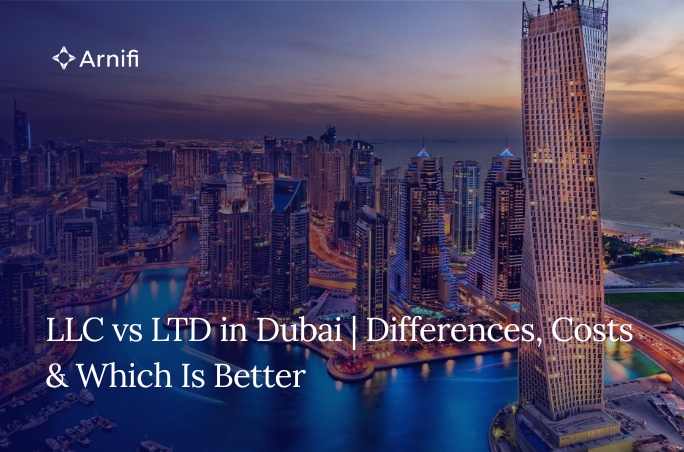Holding Company in UAE | Tax Benefits & Global Expansion
by Shethana Aug 27, 2025  9 MIN READ
9 MIN READ

The United Arab Emirates (UAE) is a place where investors and entrepreneurs from across the globe are attracted to conducting business. Its strategic location, strong economy, and investor-friendly policies make it an appropriate setup for various kinds of business entities, holding companies being one such that can fit therein. Hence, companies intending to consolidate their assets, manage their interests in several businesses, and optimize financial strategies have a lot of reasons for setting up a holding company in UAE.
This guide explains various features involved in establishing a holding company in the UAE, the very structure, and a step-by-step approach to setting it up. With expert consultation by companies like Arnifi, legalities and administration become a walk in the park, thereby ensuring your business starts from a solid platform to succeed.
Table of contents
- What is a Holding Company in UAE?
- Benefits of Setting Up a Holding Company in UAE
- Types of Holding Companies in UAE
- Holding Company Structure & Legal Requirements
- Cost of Setting Up a Holding Company in UAE
- Step-by-Step Process to Establish a Holding Company in UAE
- FAQs
- Why Choose Arnifi for Setting Up a Holding Company in UAE?
- Conclusion
What is a Holding Company in UAE?
A holding company in the UAE is an entity licensed mainly to hold the controlling interest in other companies, known as subsidiaries. This contrasts with operating companies, wherein operational activity includes the manufacture of goods or the provision of services. The main business activity of a holding company involves holding shares, intellectual property, real estate, and other assets of the companies that it controls. Such a structural arrangement allows for the central administration of diverse business interests under a single corporation.
The key features of a holding company include asset ownership and the ability to control its subsidiaries. Such control is mostly executed by holding a majority of the voting stock of its subsidiaries. This arrangement provides numerous advantages in terms of risk management and taxation. Consequently, holding companies are commonly used in areas such as real estate, investment, and in the case of multinational corporations seeking to effectively control their various portfolios.
To help with global business expansion
make sure you choose us.
Get in touch with our team to find out about our approach
BOOK FREE CONSULTATIONResponse within 24 Hours
Great, please give us a brief detail about your business.
Benefits of Setting Up a Holding Company in UAE
UAE offers all the necessary traits to nourish a holding company, along with a considerable number of strategic benefits.
- Asset Protection and Risk Management: A primary benefit of a holding company is establishing a legal separation between the parent company and its subsidiaries. Hence, the debts and liabilities of one subsidiary would not jeopardize the assets of the holding company or any other subsidiary. This structure provides a sound protection mode for your assets by really managing and mitigating the risk of all the business operations.
- Tax Benefits: The UAE has one of the best tax regimes in the world. Holding companies, especially set up in Free Zones, can enjoy a 0% corporate tax rate on qualifying income. There’s also a huge network of more than 140 double taxation treaties between the UAE and other countries, which can lower withholding taxes on dividends and capital gains that arise from foreign subsidiaries. Although a 9% corporate tax has been introduced for profits above AED 375,000 in 2023, there are exemptions that apply, especially on dividends and capital gains from participating interests.
- Easier Capital Structuring and Investment Opportunities: The holding company structure makes it much easier to raise capital and raise investment. The lenders and investors can look at the financial strength of the entire group of companies in order to resolve any issues over the financing. These arrangements enable the flexible acquisition and disposal of subsidiaries without disrupting the group’s basic core operations.
- Strategic Location for International Expansion: The UAE’s geolocation is said to be one entry route into Europe, Asia, and Africa, hence making it an ideal base for world operations and expansion. This became further important, in favor of Dubai, as a location for holding companies running global subsidiaries with the availability of top-grade infrastructure, i.e., excellent airports and seaports.
- Simplified Succession Planning and Family Business Management: Holding companies are a potentially valuable asset in succession planning and family business management. Ownership can easily be transferred through the shares of the holding company without detriment to the operation of the individual subsidiaries, thus guaranteeing smooth control transfer.
Types of Holding Companies in UAE
Numerous jurisdictions are available in the UAE, each with its advantages and its applicable regulations in setting up a holding company.
- Mainland Holding Company: The mainland holding company is registered under the federal laws of the United Arab Emirates and is free to conduct business in the whole country. In the past, a local Emirati partner had to hold at least 51% of the stake. However, following the reforms, there are many sectors where 100 percent foreign ownership is now allowed.
- Free Zone Holding Company: Free Zone holding companies are mostly favored by foreign investors, as they grant 100% foreign ownership, exemption from all taxes, and fast-track licensing. These companies are set up in specific economic zones like the Dubai International Financial Centre (DIFC) or the Ras Al Khaimah Economic Zone (RAKEZ). Nevertheless, while they usually cannot conduct business within the free zone and internationally, it provides an appropriate vehicle for holding worldwide assets.
- Offshore Holding Company: Offshore holding companies are primarily established for international tax planning and asset protection. They are typically set in jurisdictions such as Ras Al Khaimah International Corporate Centre (RAK ICC). These entities are not permitted to do business within the UAE but guarantee high-level privacy and are under simplified regulations.
| Type | Pros | Cons |
| Mainland | Flexibility to operate anywhere in the UAE. | Potentially higher setup costs. |
| Free Zone | 100% foreign ownership, tax benefits. | Generally restricted to operating within the free zone or internationally. |
| Offshore | Global tax planning, asset protection, high privacy. | Cannot conduct business within the UAE. |
To help with global business expansion
make sure you choose us.
Get in touch with our team to find out about our approach
BOOK FREE CONSULTATIONResponse within 24 Hours
Great, please give us a brief detail about your business.
Holding Company Structure & Legal Requirements
Having a holding company in the UAE implies its founding is subject to some precise legal and governance frameworks so that the ideals of incorporation and good governance are adhered to.
- Ownership and Shareholding Rules: Free Zones, Offshore, and most Mainland jurisdictions allow a hundred percent foreign ownership and mostly require no minimum share capital.
- Corporate Governance Requirements: The management board oversees the subsidiaries, appoints directors, and defines the overall strategy and policies of the group.
- Licensing Needs: A special “Activities of Holding Companies” license is required from the relevant authority, namely the DED or free zone.
- Compliance Obligations under UAE Law: Compliance with the Commercial Companies Law, not to mention AML, ESR, and corporate tax, in addition to having proper accounting, applies to all holding company entities.
Cost of Setting Up a Holding Company in UAE
The cost to be incurred for the establishment of a holding company in the UAE varies a lot based on one’s choice of jurisdiction.
A general breakdown of potential costs includes:
- License and Registration Fees: These are major expenses and differ between mainland and free zone setups.
- Trade Name Reservation: There is a fee charged for reserving the name of the company.
- Initial Approval Fees: This is a trivial charge for the initial approval from the relevant authority.
- Office Space: While some jurisdictions allow flexi-desk options, most will require a physical office, and this will have a bearing on your overall cost; for free zones, the office solutions are often cheaper.
- Visa Fees: This is an add-on to the cost of setup if visas are required for the shareholders or the employees.
Step-by-Step Process to Establish a Holding Company in UAE
Setting up a holding company in the United Arab Emirates is an uncomplicated process, especially with professional assistance.
- Choose the Jurisdiction: Decide if a Mainland, Free Zone, or Offshore setup best suits your business goals.
- Reserve a Trade Name and Prepare Documents: Reserve a compliant name and prepare requisite documents, such as passport copies, business plans, and MOA.
- Submit Application and Get Approvals: Submit the application and documents to the relevant authority (DED or free zone).
- Open a Corporate Bank Account: Once licensed, open a corporate bank account in the UAE to manage company finances.
- Post-Setup Compliance: Adhere to ongoing compliance, such as accounting, audits, and annual renewal of licenses after setup.
FAQs
1. Can a holding company in UAE own property?
Yes, it can own property in designated freehold areas, often requiring registration in specific zones like DIFC or RAKICC.
2. Do holding companies pay tax in UAE?
Yes, they are subject to corporate tax, but significant exemptions for dividends and capital gains from qualifying shareholdings often apply.
3. Is a physical office mandatory?
It depends on the jurisdiction. Free zones may offer flexi-desks, while mainland companies often require a physical office lease.
4. How long does it take to set up a holding company?
Setup time varies by jurisdiction, typically taking anywhere from a few days to a few weeks to complete the process.
5. Can foreigners fully own a holding company in UAE?
Yes, foreigners can have 100% ownership in Free Zones, Offshore jurisdictions, and now for most activities on the mainland.
Why Choose Arnifi for Setting Up a Holding Company in UAE?
Setting up a holding company in the UAE may be very complex concerning legal and administrative matters. Hence, the assistance of a proficient business setup consultant such as Arnifi proves very effective. With several years of experience within the UAE market, Arnifi has attained its aim of providing one-stop services that commence with initial consultation, all the way to jurisdictional selection, licensing, visa processing, and compliance thereafter.
With a strong local network in almost every Free Zone and more than a few Mainland authorities, our team of experts can provide customized solutions that are tailor-fit to the specific needs of investors and entrepreneurs, thereby ensuring a smooth and hassle-free setup experience. At Arnifi, we are committed to delivering transparent, efficient, and reliable services towards laying a strong foundation for your business in the UAE.
Conclusion
The establishment of a holding company in the UAE is a strategic advantage for investment and business purposes in asset preservation, liability extinguishment for tax purposes, and an efficient means of managing a diversified portfolio. Both an overtly pro-business atmosphere and solid legal jurisdictions give the UAE that extra edge as a unique venue for corporate structures. Our team of dedicated professionals shall guarantee your holding company is properly structured from day one for a long road of successful operations.
Want to set up a holding company in UAE? Talk to Arnifi’s experts today and make sure your setup is done right!
Top UAE Packages

Related Articles
Top UAE Packages



